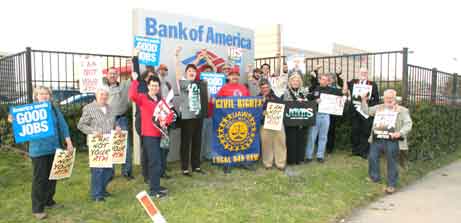Unemployment Survey Analyzed
In June, 2011, Dr Jann Aldredge-Clanton created a survey for the Workers Rights Board of North Texas Jobs with Justice. Both paper and on-line versions were made. Jobs with Justice included an invitation to use the survey on two e-mail blasts of over 2,000 each. The paper versions were put on the Jobs with Justice table at the Texas AFL-CIO convention June 9-11. Approximately 250 union delegates attended. On July 9, data were analyzed from both the online survey at http://www.surveymonkey.com/s/LYLX9CZ and from the paper version.

Public perception of the crisis
The first and most remarkable inference is that the general public remains very apathetic about the unemployment issue. The on-line version collected 15 responses, including at least 4 from the group that helped create the survey; the union delegates filled out only 5. The total number who responded to the last question, "Would you like to be contacted about ways to help..." was only 6 so far. It would be misleading to infer that the public doesn't care about unemployment, but one might safely say that they do not yet see an active role for themselves in fighting the crisis. In other words, the problem may be neither ignorance nor concern; but malaise.
Fourteen of the 20 respondents had a family member unemployed. Only 3 said they were "paid what I'm worth," with the rest suffering lower pay. Everybody considered the jobs crisis either "very" or "extremely" serious. Of the solutions proposed, 15 said "public works projects," 8 said "shorten working hours," 9 wanted "aid to small business," 2 said "lower taxes on corporations," and two "other" proposals were: "abolish militarism," and "stop outsourcing."
Question 5 asked "What ways do you think we can create jobs?" "infrastructure improvements" drew 9, "lower taxes on small businesses" drew 10, "raise taxes to support more government jobs" drew 14, "public works projects" drew 16, "hire more public school teachers" drew 16, "address nursing shortage with scholarships for nursing students" drew 14 and "other" drew 5: "shorten working hours," "castrate or spay Republicans," "Green power," "End military budget," and "pubic works projects."
Calling for government action is correct
Unanimously, the respondents believed that government must play a "big" or "active" role in remedying the jobs crisis. When actions were proposed, the respondents said they would take all the proposed actions, but "attend a rally" and "write letters to Congress" received the highest responses of 17 each. Nine said they would be willing to speak to a church or community group. The two "Other" suggestions were "web page and e-blasts" and "shorten the work week."
Nineteen respondents would defend the right of workers to organize at their workplaces. Of those actually volunteering to help (last question), 8 responded on-line, but 4 of them were already Workers Rights Board activists. Two responded on the written version.
In summary, we can surmise that people with high consciousness of the unemployment problem believe that government action on the jobs crisis is necessary and are willing to help build support through public activities; however, our numbers remain small. The inferences are unfortunately consistent with turnout at public actions so far in this crisis. Nevertheless, it is grossly overreaching to conclude that unemployment doesn't matter, especially as it continues to worsen.
Join or donate to North Texas Jobs with Justice